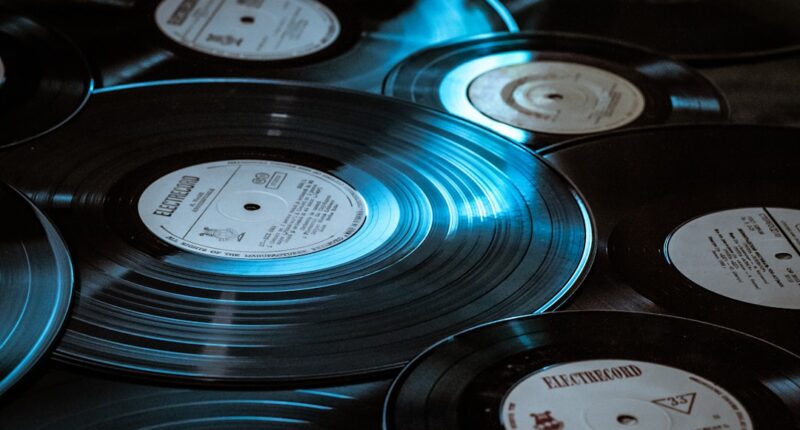Having a solid album promotion plan is crucial for any artist or band looking to make a mark in the music industry. It is not enough to simply create great music; you need to have a strategy in place to effectively promote and market your album to reach your target audience. A well-crafted album promotion plan can help you increase album sales, build a loyal fanbase, and create buzz around your music.
Creating a successful album promotion plan involves several elements. First, you need to understand the different types of music marketing strategies that can be used to promote your album. This includes online marketing strategies such as social media promotion and email marketing, as well as offline strategies like press releases and live performances. Additionally, you need to develop a budget for your music marketing efforts, identify your target audience, and utilize various platforms and tools to measure the success of your campaign.
Key Takeaways
- Crafting a promotion plan is crucial for album success
- Music marketing strategies are essential for reaching a wider audience
- Music marketing plays a vital role in album promotion
- A well-planned music marketing plan is necessary for success
- Identifying your target audience is key to effective music marketing
Understanding Music Marketing Strategies
Music marketing refers to the process of promoting and selling music through various channels and platforms. The purpose of music marketing is to create awareness about an artist or band, generate interest in their music, and ultimately drive album sales. There are different types of music marketing strategies that can be used to achieve these goals.
Online music marketing strategies involve utilizing digital platforms such as social media, websites, and streaming services to promote an album. This includes creating engaging content for social media platforms like Facebook, Twitter, and Instagram, as well as utilizing email marketing campaigns to reach fans directly. Offline music marketing strategies include traditional methods such as press releases, radio promotions, and live performances.
Grassroots music marketing strategies involve building a fanbase from the ground up by connecting with fans on a personal level. This can include hosting intimate concerts or meet-and-greets, engaging with fans on social media, and utilizing word-of-mouth marketing techniques.
Each type of music marketing strategy can be used to promote an album in different ways. For example, online marketing strategies can help create buzz around an album by sharing behind-the-scenes content, releasing teasers, and engaging with fans through live streams or Q&A sessions. Offline marketing strategies can help reach a wider audience through radio promotions, press coverage, and live performances.
Importance of Music Marketing in Album Promotion
Music marketing plays a crucial role in increasing album sales and building a loyal fanbase. Without effective marketing strategies, even the best albums can go unnoticed and fail to reach their full potential. Successful album promotion campaigns often utilize music marketing strategies to create awareness, generate interest, and drive sales.
One example of a successful album promotion campaign that utilized music marketing strategies is Taylor Swift’s album “1989.” Swift and her team employed a multi-faceted marketing approach that included social media promotions, live performances, and collaborations with influencers. By engaging with her fans on platforms like Twitter and Instagram, Swift was able to create excitement and anticipation for the album’s release. The album went on to become one of the best-selling albums of all time.
Another example is Beyoncé’s surprise album release in 2013. Beyoncé dropped her self-titled album without any prior announcement or promotion, relying solely on social media to spread the word. This unconventional marketing strategy generated a huge amount of buzz and resulted in record-breaking sales within the first week of release.
Creating a Music Marketing Plan
| Metrics | Description |
|---|---|
| Target Audience | The specific group of people that the marketing plan is aimed at reaching. |
| Marketing Goals | The specific objectives that the marketing plan aims to achieve. |
| SWOT Analysis | An assessment of the strengths, weaknesses, opportunities, and threats related to the music marketing plan. |
| Marketing Mix | The combination of product, price, promotion, and place that will be used to market the music. |
| Budget | The amount of money that will be allocated to the marketing plan. |
| Timeline | The specific dates and deadlines for implementing the marketing plan. |
| Metrics for Success | The specific measurements that will be used to determine the success of the marketing plan. |
Creating a music marketing plan involves several steps that are essential for a successful album promotion campaign. The first step is setting clear goals for your campaign. These goals can include increasing album sales, growing your fanbase, or generating buzz around your music.
Once you have set your goals, the next step is to identify your target audience. Understanding who your music appeals to will help you tailor your marketing efforts to reach the right people. Factors such as age, gender, location, and music preferences can all play a role in identifying your target audience.
After identifying your target audience, you can then choose the marketing strategies that will be most effective in reaching them. This can include online strategies such as social media promotion, email marketing, and influencer collaborations, as well as offline strategies like press releases, radio promotions, and live performances.
It is important to create a music marketing plan that is tailored to your unique needs and goals as an artist. What works for one artist may not work for another, so it is important to experiment with different strategies and adapt your plan as needed.
Developing a Music Marketing Budget
Having a budget for music marketing is essential for ensuring that your promotional efforts are realistic and effective. A budget helps you allocate resources effectively and ensures that you are not overspending on marketing activities.
When creating a music marketing budget, it is important to consider all the different elements that go into promoting an album. This includes costs for social media advertising, website development, graphic design, press releases, live performances, and any other marketing activities you plan to undertake.
It is also important to consider the return on investment (ROI) for each marketing activity. Some activities may have a higher ROI than others, so it is important to prioritize your budget accordingly. For example, if social media advertising has been proven to generate more album sales than press releases, it may be wise to allocate more of your budget towards social media advertising.
Additionally, it is important to regularly review and adjust your budget as needed. Marketing trends and strategies are constantly evolving, so it is important to stay flexible and adapt your budget accordingly.
Identifying Your Target Audience

Identifying a target audience is a crucial step in music marketing. Understanding who your music appeals to will help you tailor your marketing efforts to reach the right people and increase the chances of success.
There are several factors to consider when identifying your target audience. Age, gender, location, and music preferences are all important factors to consider. For example, if your music appeals to a younger demographic, you may want to focus your marketing efforts on platforms like TikTok and Instagram. If your music appeals to a specific genre or subculture, you may want to target online communities or forums where fans of that genre gather.
It can also be helpful to conduct market research or surveys to gather more information about your target audience. This can help you understand their preferences, interests, and behaviors, which can inform your marketing strategies.
Once you have identified your target audience, you can then tailor your marketing messages and content to resonate with them. This can include creating social media posts that speak directly to their interests, collaborating with influencers who have a similar fanbase, or hosting live performances in locations where your target audience is likely to be.
Utilizing Social Media for Music Marketing
Social media plays a crucial role in music marketing. Platforms like Facebook, Twitter, Instagram, and TikTok provide artists with a direct line of communication to their fans and offer a powerful tool for promoting an album.
When using social media for music marketing, it is important to create engaging and shareable content that resonates with your target audience. This can include behind-the-scenes footage, exclusive sneak peeks of new music, live streams, Q&A sessions, and interactive contests or challenges.
It is also important to engage with your fans on social media by responding to comments and messages, sharing user-generated content, and showing appreciation for their support. Building a strong online community can help create a sense of loyalty and connection with your fans.
In addition to organic social media content, it can also be beneficial to invest in social media advertising. Platforms like Facebook and Instagram offer targeted advertising options that allow you to reach specific demographics or interests. This can help increase the visibility of your album and reach new potential fans.
Building a Music Marketing Blog
Having a music marketing blog can be a valuable tool for promoting an album and engaging with fans. A blog allows you to share in-depth content, behind-the-scenes stories, and updates about your music and career.
When building a Music Marketing Blog, it is important to create content that is engaging and informative for your fans. This can include album reviews, interviews with band members, tutorials or lessons related to your music, and updates about upcoming shows or releases.
It is also important to optimize your blog for search engines by using relevant keywords and meta tags. This can help increase the visibility of your blog in search engine results and attract new visitors.
Additionally, it can be beneficial to collaborate with other bloggers or influencers in the music industry. Guest posting on other blogs or participating in interviews or features can help increase the reach of your blog and expose your music to new audiences.
Collaborating with Influencers for Music Marketing
Collaborating with influencers can be a powerful way to promote an album and reach new audiences. Influencers are individuals who have a large following on platforms like YouTube, Instagram, or TikTok and can help amplify your message to their fanbase.
When identifying potential influencers for collaboration, it is important to consider their relevance to your target audience. Look for influencers who have a similar fanbase or who create content that aligns with your music. For example, if you are a pop artist, collaborating with a beauty influencer who has a large following among young women may be a good fit.
Approaching influencers for collaboration can be as simple as reaching out via email or direct message and expressing your interest in working together. It is important to be clear about what you are offering in return for their promotion, whether it be free merchandise, exclusive content, or financial compensation.
Collaborating with influencers can help increase the visibility of your album and generate buzz among their fanbase. It can also help you tap into new markets and reach audiences that may not have been aware of your music before.
Measuring the Success of Your Music Marketing Campaign
Measuring the success of your music marketing campaign is essential for evaluating the effectiveness of your strategies and making informed decisions for future campaigns. There are several metrics that can be tracked to measure the success of your campaign.
One important metric to track is album sales. This can be done through platforms like iTunes, Spotify, or Bandcamp, as well as physical sales through merch stores or live performances. Tracking album sales can help you understand how well your marketing efforts are translating into actual sales.
Website traffic is another important metric to track. By using tools like Google Analytics, you can see how many people are visiting your website, where they are coming from, and what pages they are visiting. This can help you understand which marketing channels are driving the most traffic to your website and which pages are resonating with your audience.
Social media engagement is another key metric to track. This includes metrics such as likes, comments, shares, and followers on platforms like Facebook, Twitter, Instagram, and TikTok. Tracking social media engagement can help you understand how well your content is resonating with your audience and which types of posts are generating the most engagement.
It is important to regularly review and analyze these metrics to identify trends and patterns. This can help you make data-driven decisions for future marketing campaigns and optimize your strategies for maximum impact.
Crafting a solid album promotion plan is essential for any artist or band looking to make a mark in the music industry. Understanding music marketing strategies, creating a tailored marketing plan, developing a budget, identifying a target audience, utilizing social media and influencers, building a music marketing blog, and measuring the success of your campaign are all key elements in creating an effective album promotion plan.
By following these tips and strategies, you can increase album sales, build a loyal fanbase, and create buzz around your music. Remember to stay flexible and adapt your plan as needed, as the music industry is constantly evolving. With a well-crafted album promotion plan, you can take your music career to new heights and reach your goals as an artist.
If you’re looking for more insights on crafting an effective album promotion plan, you should definitely check out this article on Music Marketing Blog. In their post titled “Hello World,” they provide valuable tips and strategies to help musicians navigate the ever-changing landscape of music marketing. From building a strong online presence to leveraging social media platforms, this article offers practical advice to help artists promote their music successfully. Don’t miss out on this resource – click here to read the full article! https://musicmarketing.blog/hello-world/
FAQs
What is a marketing strategy for music?
A marketing strategy for music is a plan that outlines how an artist or record label will promote and sell their music to their target audience. It includes tactics such as social media marketing, advertising, public relations, and live performances.
Why is a marketing strategy important for musicians?
A marketing strategy is important for musicians because it helps them reach their target audience and increase their fan base. It also helps them sell more music and merchandise, book more gigs, and ultimately make a living from their music.
What are some common marketing strategies for music?
Some common marketing strategies for music include social media marketing, email marketing, advertising, public relations, live performances, and collaborations with other artists or brands.
How do you create a marketing strategy for music?
To create a marketing strategy for music, you should start by identifying your target audience and understanding their preferences and behaviors. Then, you can develop tactics that will reach and engage them, such as social media campaigns, email newsletters, and live performances. It’s also important to set goals and track your progress to ensure that your strategy is effective.
What are some tips for promoting an album?
Some tips for promoting an album include creating a strong social media presence, reaching out to music bloggers and influencers, offering exclusive content to fans, and planning a release party or tour. It’s also important to have a clear brand and message that resonates with your target audience.









